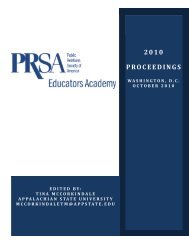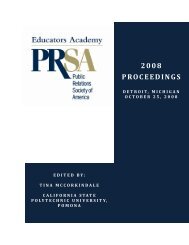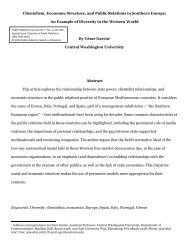2012 PROCEEDINGS - Public Relations Society of America
2012 PROCEEDINGS - Public Relations Society of America
2012 PROCEEDINGS - Public Relations Society of America
You also want an ePaper? Increase the reach of your titles
YUMPU automatically turns print PDFs into web optimized ePapers that Google loves.
The ethical dilemmas described by Millennials are <strong>of</strong>fered below in order <strong>of</strong> prominence,<br />
beginning with the dilemmas most commonly discussed. The most significant pressure<br />
participants faced involved breaches <strong>of</strong> responsibility to clients in attempt to look better,<br />
maximize pr<strong>of</strong>its, or both. Breaches <strong>of</strong> responsibility included helping competitors, committing<br />
malfeasance, overpromising, using the bait and switch, padding media coverage, covering up<br />
mistakes and bad news, and wrongfully billing.<br />
Helping competitors. Numerous participants discussed situations in which there was a<br />
temptation to share private client information:<br />
A coworker <strong>of</strong> mine was asked by a former boss who was now at a competing agency for<br />
some confidential client documents to help with a pitch for a competitor. All I can figure<br />
out is she wanted to impress this former boss or in some way felt an obligation because<br />
she shared the documents. In the end, she got fired.<br />
Several participants identified the possibility <strong>of</strong> helping competitors and addressed the dilemma<br />
by not sharing insider information:<br />
Knowing that I had insider knowledge on the competition, I know that it would be wrong<br />
to share that. … In the end, I did participate in the new business pitch. I still feel like this<br />
was, in part, not ethical. But I also was careful not to share any <strong>of</strong> the ―insider<br />
information‖ I had on my client and on the new business prospect.<br />
Participants had various views about whether insider information could be shared. For example,<br />
one participant wrote<br />
We have, on two different occasions, retained on an account team an individual who had<br />
worked for a competitor to that account less than a year earlier. This type <strong>of</strong> information<br />
sharing does not sit well with me, but as a relative junior there is little I can do. I<br />
understand that this is commonplace in the industry and is actually looked upon as a<br />
selling point in certain new business situations, but it does seem unethical to me.<br />
Another participant responded, ―If your co-worker didn‘t have to sign a non-disclosure<br />
agreement before leaving the competitor then technically there‘s nothing wrong with this.‖<br />
Another participant discussed working ―under a different company name in order to do work for<br />
a competing client.‖ In this case, the conflict was that the parent companies competed; however,<br />
the product categories were different. In addition, a participant discussed a co-worker who did<br />
freelance work for a client‘s competitor, which was ―not only unethical but a poor decision as it<br />
was not worth the risk <strong>of</strong> losing the client.‖<br />
Committing malfeasance. Many participants discussed their discomfort with malfeasance:<br />
My agency‘s worst <strong>of</strong>fense in my opinion is knowingly selling services and products that<br />
a client does not need. I understand the pressure <strong>of</strong> pr<strong>of</strong>itability in a rough economy, but<br />
ultimately the services a client does not need will only work to hurt the agency/client<br />
relationship and hinder our results. … My agency needs to stop this practice.<br />
Some people, such as the participant featured above, positioned their discomfort in terms <strong>of</strong><br />
long-term effectiveness, and others positioned the issue in term <strong>of</strong> ethics: ―Pitching them things<br />
or services they don‘t need just to get money for our agency is unethical in my opinion.‖<br />
In addition to stories in which agencies committed malfeasance, other stories showed<br />
agencies that at least initially resisted it or fired employees for it. For example, one participant<br />
discussed her agency‘s unsuccessful attempts to dissuade a client from public relations services<br />
that would result in a ―very low return on investment.‖ The agency ultimately complied with the<br />
requests to avoid losing the account. The Millennial involved reflected, ―I thought this situation<br />
was both damaging to us and to our clients. It is our job as public relations pr<strong>of</strong>essionals to<br />
36
















